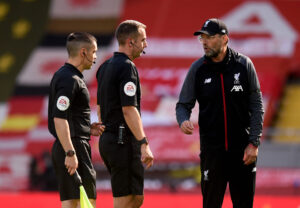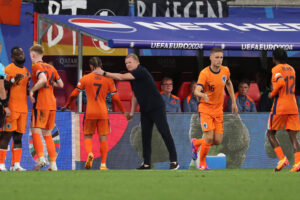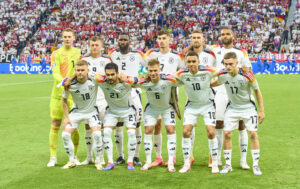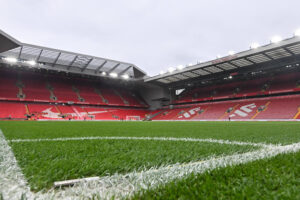UEFA made the decision to stage Euro 2020 all over Europe, rather than in one or two host countries, in order to celebrate the 60th anniversary of the first staging of the European Championship. It always appeared an unwise decision, one that risked diluting the energy generated by staging the tournament in just one or two countries, as is customary, across an entire continent. Now, however, in the wake of the Coronavirus pandemic, it appears to be a positively ridiculous one, with the inherent dangers of teams flying all over Europe rather than remaining in one country (as was the case last year when Germany hosted the final rounds of the Champions League and Europa League) only exacerbated by the attendant climatic costs.
It is, of course, wonderful that the tournament is happening at all, especially as it will be the last major summer tournament for a while; next year’s World Cup, of course, will regrettably take place in the autumn. Consequently, we should enjoy this Euros, even if its strange staging makes it unlikely that it will create the same kind of intensity and enjoy the same kind of focus as these great European Championship tournaments of the past.
Here, then, are the five finest European Championship tournaments from the first six decades of the Euros, in ascending order.
The Finest European Championship Tournaments
5. Euro 2016 (France)
Such has been the success of the two European Championship tournaments held in France (and there is more on the other one later) that there have even been calls for France to be made the permanent hosts of the event. With its central location and excellent transport network, France certainly is an incredibly attractive setting for any event that attracts fans from all over Europe. However, the obvious unfairness of allowing just one nation to be the permanent host of a major international event made the idea a non-starter. Men’s tennis has recently discovered that, making Turin and Innsbruck co-hosts of the Davis Cup rather than just allowing it to be permanently staged in Madrid.
Euro 2016 was a particularly memorable Euros because, like Euro 2020, it had been in danger of not happening at all. That was because of the November 2015 Paris terrorist attacks in which 130 people were killed, 90 of them at the Bataclan theatre. It was feared that hosting huge crowds for football matches, not only at the grounds themselves but at the fan parks where thousands gathered to watch games on huge TV screens, would be a recipe for further terrorist atrocities.
Thankfully, UEFA and the French Government stood firm and insisted that Euro 2016 went ahead as planned. The result was a genuinely joyous tournament, with fans from all the 24 countries competing (after the tournament had expanded from the 16-team event it had been since 1996) joining in the most heartfelt renditions of La Marseillaise since the end of World War Two. Only the fact that the hosts lost in the final to Portugal prevented it from being a perfect tournament for France, but the fact that it happened at all was still a genuine cause for celebration.
4. Euro 2008 (Austria and Switzerland)
Such are the financial and logistical demands of hosting a major summer football tournament like the European Championship or the World Cup that increasingly countries are not bidding for them in isolation but in partnership with their near-neighbours. As a result, the 2026 World Cup will be a pan-North American event taking place across the USA, Canada and Mexico. And only this week Spain and Portugal announced a joint bid for the 2030 World Cup, formally announcing their bid before the two countries’ Euro 2020 warm-up match, which fittingly and diplomatically ended 0-0.
In a similar vein, Austria and Switzerland were co-hosts of Euro 2008, with Vienna the venue for the final. Unfortunately for fans of the two co-hosts, neither of their sides got anywhere near that match. Indeed, both sides went out in the first round, winning only one game between them and even that was an ultimately pointless one, as Switzerland beat a Portugal side that had already qualified for the knockout stages.
Initially, Portugal, who had Cristiano Ronaldo in his pomp after leading Manchester United to a Champions League triumph in Moscow against Chelsea (despite missing a spot-kick in the penalty shootout that settled the game), looked as if they might go all the way and win Euro 2008. However, the announcement halfway through the tournament that their manager, Felipe ‘Big Phil’ Scolari, would be leaving to take over at Chelsea seemed to unsettle them. Instead, it was ultimately Spain, their Iberian neighbours and potential 2030 World Cup co-hosts, who won the tournament, defeating Germany in the final, with the first iteration of a truly great team that would dominate international football for the next four years.
3. Euro 2004 (Portugal)
Of course, Portugal had also failed to win the Euros four years earlier when they were the sole hosts of Euro 2004. After losing to rank outsiders Greece in their opening match, they fought their way to the final, beating Spain and Holland in the process. However, they then made the extraordinary error of effectively staging a celebratory bus ride before the final even took place, as their coach wound its way to Benfica’s Estádio da Luz through seemingly the whole of Lisbon. It meant that by the time the match actually kicked off, the Portuguese team had already been drained of most of their emotional energy. They consequently lost to Greece for a second time.
Euro 2004 may have been won by a relatively poor team, the ultra-defensive Greece of Otto Rehhagel, that did not begin to compare to the greatest European Championship-winning sides that preceded it. However, that does not mean it was a poor tournament, as Portugal was illuminated by various footballing delights: the spectacular arrival at a major tournament of the 18-year-old Wayne Rooney (sadly, it would prove to be the only major tournament at which he would play spectacularly); a superb Czech side, spearheaded by the 2003 European Footballer of the Year Pavel Nedvěd, that really should have won the tournament; and arguably the greatest game of football ever played (at least in the opinion of Alan Hansen), which was the first-round classic between the aforementioned Czechs and a fine Dutch side, which the Czechs won 3-2 at the death.
2. Euro 96 (England)
And so we come to the two European Championship tournaments that really stand out in the memory as the finest, albeit with vastly differing outcomes for the two host nations. The first of them is Euro 96, which was hosted in England, the first time that the birthplace of football had hosted a major football tournament since the World Cup win of 1966. Of course, in 2021 England may end up playing a de facto home tournament; because of the cancellation of games in Dublin, due to Coronavirus restrictions, if England progress beyond the first round they will play all their remaining games at Wembley. However, in 1996 England were the official host nation and the team, and indeed the entire country, made the most of it – or almost did.
Famously, England went all the way to the semi-final, en route producing probably their finest all-round performance since the 1966 World Cup win when they defeated Holland 4-1. They were partly borne along, and aloft, by the sound of seemingly the entire country singing ‘Football’s Coming Home’, the unofficial tournament anthem written by David Baddiel, Frank Skinner and Ian Broudie of The Lightning Seeds. Ultimately, however, it was Germany that stole not only the crown, first beating England in the semi-final and then defeating the Czech Republic with a Golden Goal winner in the final, but the hosts’ own anthem, as German fans gleefully adopted ‘Football’s Coming Home’ as their own unofficial favourite song.
1. Euro 84 (France)
It is no coincidence that the greatest international football tournaments tend to be the smallest. Quite simply, the fewer nations involved, the fewer games and the more chance, therefore, that every game will really count, almost becoming a final in its own right. That was certainly the case in Euro 84, staged in France, when there were only eight teams involved but seemingly an endless succession of truly great matches. At the time, World Soccer magazine said that it was the finest international tournament since the 1970 Mexico World Cup (one of the last World Cups to feature only 16 nations) and nearly 40 years on it is certainly possible to argue that it is the greatest European Championship tournament there has ever been.
Almost all of the eight finalists harboured genuine hopes of winning the tournament, but as it progressed a superb Denmark side looked as if they would make the final until they were defeated by Spain on penalties in the semi-final. Ultimately, however, it was the hosts who won the tournament, France’s first-ever major international success, with their so-called Magic Square of a midfield – Michel Platini, Alain Giresse, Jean Tigana and Luis Fernández – almost constituting an entire team in itself. Even if the final, a tense 2-0 win over Spain that was arguably the worst match of the tournament, was a damp squib, it didn’t matter. That was because football fans everywhere, and particularly in France, were still mesmerised by the memory of France’s 3-2 win in extra-time over the tournament’s surprise package, Portugal. That was undoubtedly the greatest single knockout match in European Championship history and one of the finest and most exciting games of football ever played anywhere.
Main Photo






